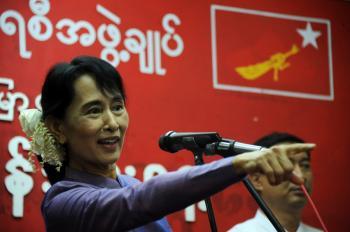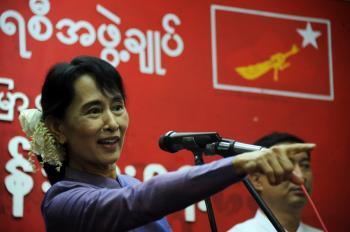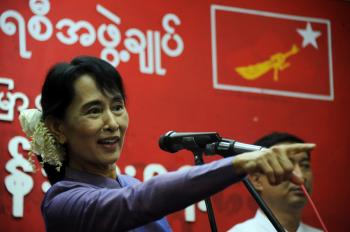The great fanfare that surrounded the release of Burma’s icon of freedom Aung San Suu Kyi last November has died down. Since then, the Nobel laureate who spent the last seven years under house arrest and 15 of the last 20 years in some form of detention has been quietly busy, walking the fine line between resuming her work, and trying not to provoke another arrest.
Suu Kyi is once again active in her role as general secretary of her National League for Democracy (NLD) Party, despite the Party having been formally disbanded for refusing to participate in the show elections last November. Suu Kyi, 65, is also focusing on gathering young people from Burma’s different ethnic and minority groups to engage them in civic networks.
Toe Zaw Latt, Thailand bureau chief of the Democratic Voice of Burma, an independent Burmese media, says he sees an important improvement in Burma since Suu Kyi’s release: the law prohibiting more than five people to gather for political purposes has been broken many times.
“What Suu Kyi is doing, is an open defiance to this law. Now people, especially youth, gather and talk openly,” said Latt.
Other observers, however, say that Suu Kyi’s freedom is only skin-deep and her release has so far been able to effect little change to Burma (also known as Myanmar).
While Suu Kyi has been granted access to both the Burmese people and the international community, sources close to her and the NLD reveal that she still lacks secure Internet and telephone connections.
Patricia Taft, senior associate and director of The Fund for Peace wrote in an e-mail from her office in New York that Suu Kyi is propelled to very carefully consider her words and actions in order to avoid another period of house arrest. In terms of travel, the generals ruling Burma have not made any special statements, but Taft believes the regime strictly controls her movements.
“It is virtually guaranteed that if she were to leave the country, she would never be allowed re-entry,” wrote Taft.
According to Zoya Phan, campaigns manager at Burma Campaign U.K., since her release, Suu Kyi has never traveled outside of Rangoon (known now as Yangon), the former capital and main city in Burma.
“We have to see how the regime will respond if she does.”
It was on a trip to northern Burma in 2003, during Suu Kyi’s last respite from detention, that her motorcade was ambushed and military thugs assassinated several of her bodyguards and arrested Suu Kyi. Her detention lasted until November.
Taft says the outside world hasn’t heard much about Suu Kyi’s activities since November probably because they are preoccupied with events in the Middle East, and truth be told, there are no striking changes to report. Or there may be more to it.
“I would like to think that there is also concern that reporting on her too widely would compromise her freedom and make her seem more of a threat to the regime, although I am not certain the media think this way,” wrote Taft.
Walking the Tightrope
Sein Win, prime minister in exile of the National Coalition Government of the Union of Burma (NCGUB), is also worried that after some time the authorities will decide to stop Suu Kyi’s activities.
“We are concerned that the authorities will crack down on Daw Aung San Suu Kyi and [the] NLD party after some time, after they have formed the so-called ‘civilian government,’” wrote Sein Win, who is also Suu Kyi’s first cousin, in an e-mail.
Although the generals released her, Sein Win says nothing else has improved in terms of human rights violations, lack of democracy, corruption, and mismanagement.
“We see that the whole situation has not changed and problems remain despite the 2010 elections. So our struggle will go on and NCGUB will continue its work.”
Sein Win’s fears are warranted. In an article by Burma’s state-controlled media last week, Suu Kyi was warned to be careful of what she says or she and her party will “meet their tragic ends.”
U.S. Senate Republican Leader Mitch McConnell, who spoke to Suu Kyi by phone on Feb. 15, released a statement saying he is “deeply concerned about the junta’s recent threats to her well being and those of her National League for Democracy colleagues.”
Continued on following page.







